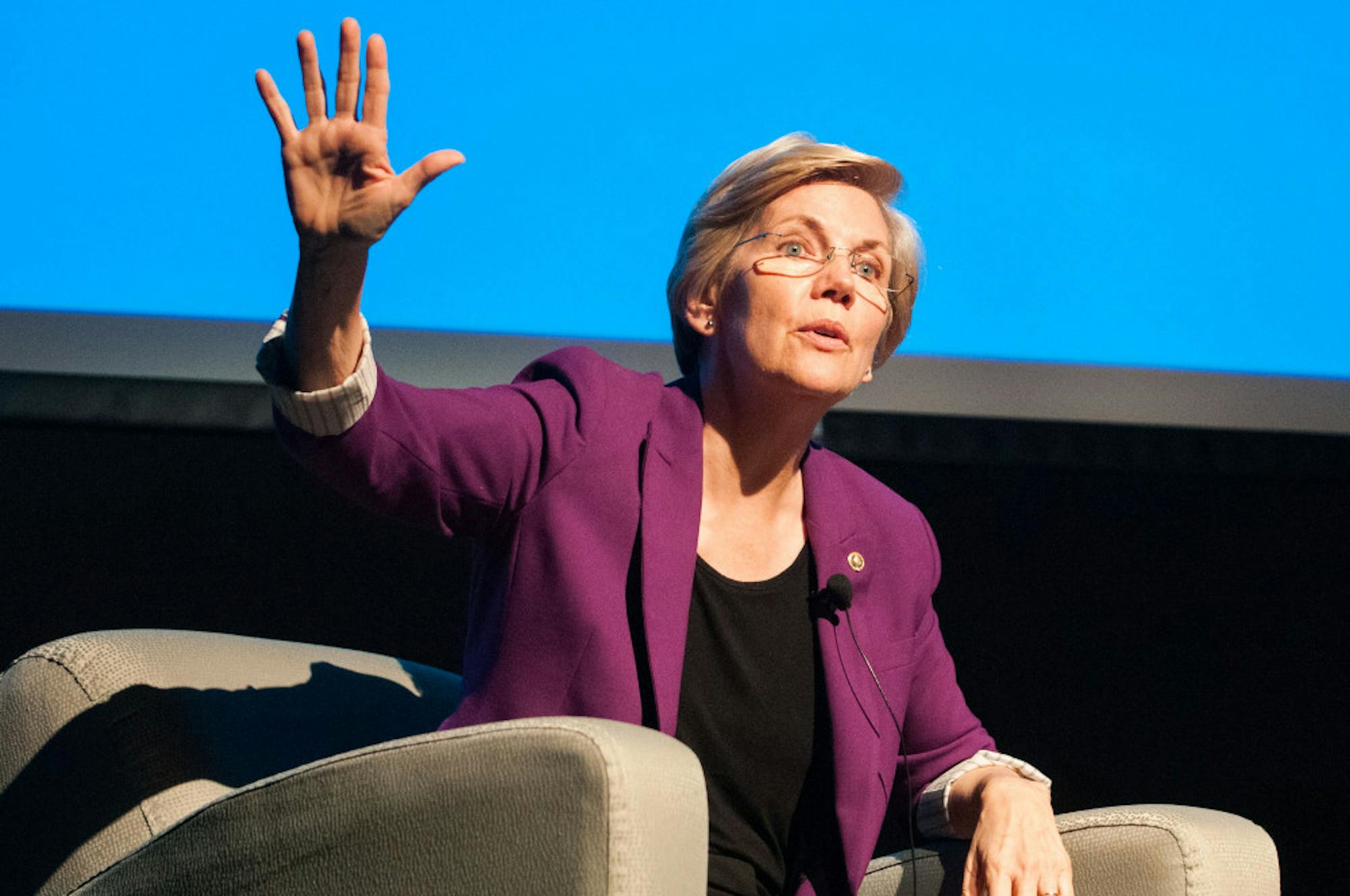Sen. Elizabeth Warren (D-Mass.) spoke about her life, the economy and higher education at Tufts yesterday for the Alan D. Solomont Lecture on Citizenship and Public Service.
Structured as a question-and-answer session between Warren, students and Solomont (A ’70), the Pierre and Pamela Omidyar Dean of the Jonathan M. Tisch College of Citizenship and Public Service at Tufts, the lecture explored Warren's personal history growing up in Oklahoma and delved into the senior senator's work tightening federal regulations on the financial sector. Warren also participated in a closed forum with Tufts student leaders before the lecture.
Warren, who defeated Tufts alumnus Scott Brown (LA ’81) to win her Senate seat in a heated 2012 race, was the series’ third speaker. She was preceded by Solomont, who spoke last April, and House Minority Leader Nancy Pelosi (D-Calif.) in 2011.
Warren was a professor at Harvard Law School when, in 2007, she proposed the Consumer Financial Protection Bureau, which has since redirected $4 billion to those who were “cheated” by systematic financial industry failures, she said. She described her role in creating the agency as that of an “intrepid girl policy maker.”
“Washington isn’t working at all,” Warren said. “All we got is our voices and our votes, and if we don’t use them, this country fundamentally changes.”
Although Warren said she is not worried about a repeat of the 2008 financial crisis, she explained she is “scared” about the continued growth of finance companies.
“There are the systemic risks that still leave America’s families at risk,” Warren said.
In May of last year, Warren proposed a bill that would enable borrowers to refinance their student loans at lower rates. Although Senate Republicans blocked the measure, Warren cited the so-called Bank on Students Loan Fairness Act as an example of her work to reduce college costs.
She described a dichotomy between the financial support offered to college students now and that which she received for university.
“I grew up in an America that was investing in kids like me,” Warren said. “We are losing that America, and we have to fight to get it back.”
When applying to colleges herself, Warren said she looked for schools that had scholarships for students who had participated in high school debate. Her family could not have afforded to pay for school on their own, she said. She ultimately attended George Washington (GW) University over Northwestern because the former offered her more money.
Warren's mother, who worked a minimum-wage job at Sears to support the family, didn't think going to college was a good idea for her daughter.
“She wanted me to marry well, because she thought it was my only chance, and she thought it was an iffy case, which was right,” Warren said, laughing. “What she showed me was you get up and do, and you do the best you can.”
Though Warren dropped out of GW at age 19 to get married, she graduated with a degree from University of Houston and went on to Rutgers School of Law.
While a dozen people held signs outside the lecture venue in protest of Warren's previous pro-Israeli statements, three activists each asked the senator about her stance on the conflict.
“I want to see the world support Israel and the Palestinians as they move toward a two-state solution,” Warren said. “I’m really concerned that is not the direction the Middle East is headed right now ... Bombing each other is not moving in the right direction, and I want to see it stop.”
This year's event was also the first in a new Tisch College Distinguished Speaker Series. Former Secretary of Health and Human Services Kathleen Sebelius will be the series' second speaker in November, and Boston Mayor Marty Walsh will be the third in December.
Warren discusses economy, higher education at Solomont Lecture

–U.S. Senator, Elizabeth Warren (D-Mass) speaks during the Alan D. Solomont Lecture on Citizenship and Public Service in Cohen Auditorium on Tufts' campus on September 15th, 2014.





